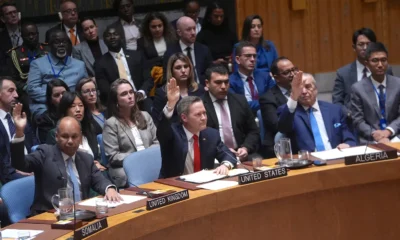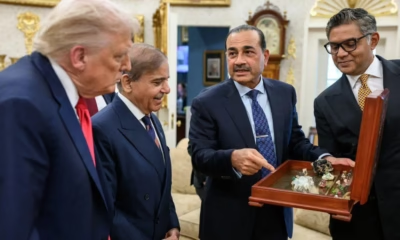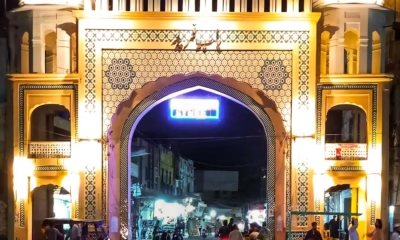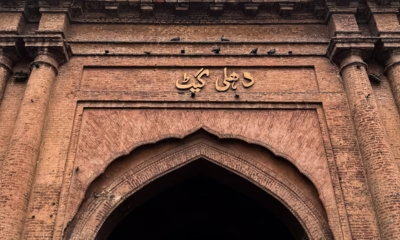Politics
Letters, threats and intimation: Military’s blatant interference in judicial affairs of Pakistan
Judges from Pakistan’s Supreme Court, Islamabad, Lahore & Peshawar High Courts are decrying interference by the military in judicial affairs.
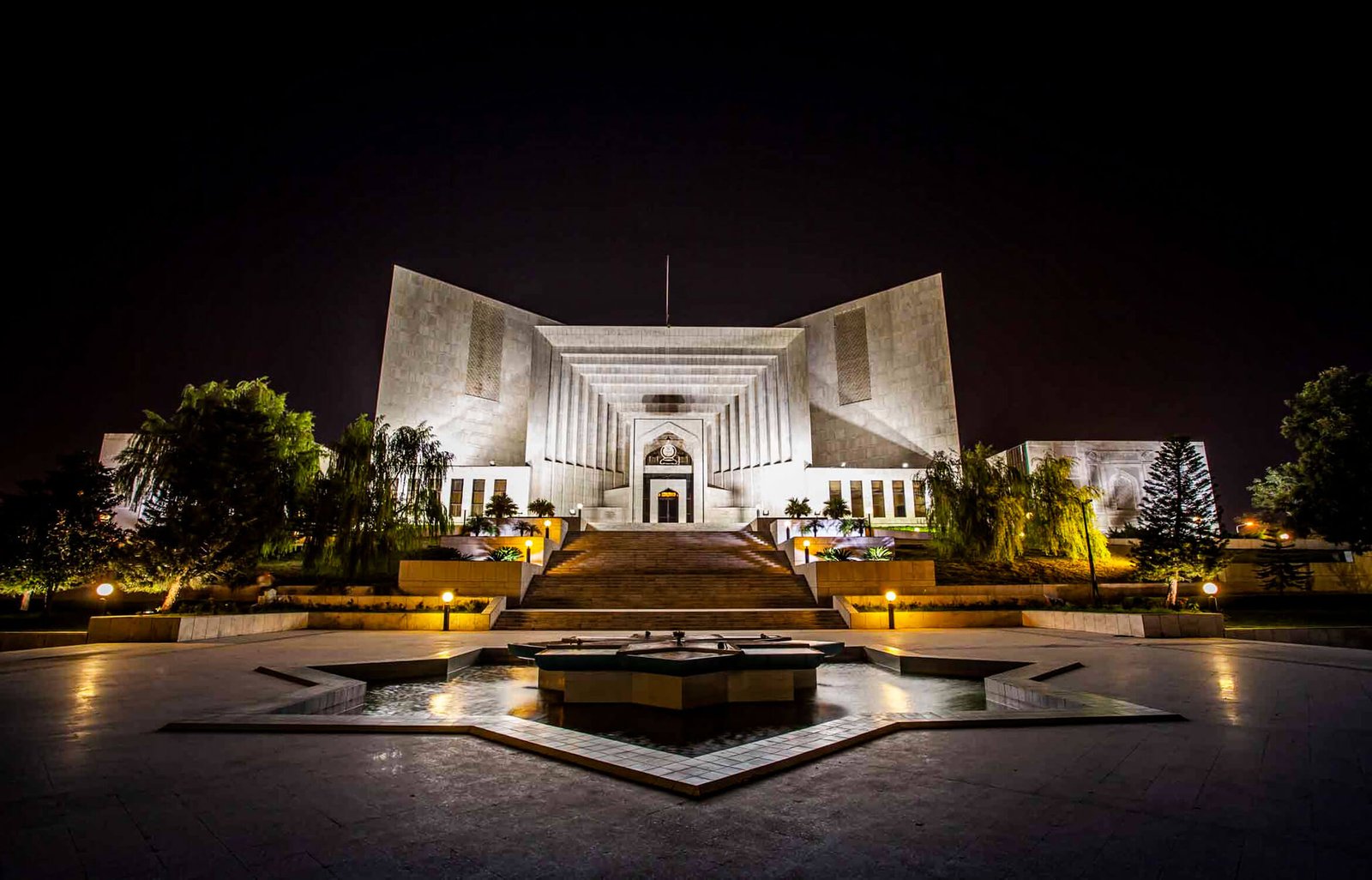
In a land where justice often fades before reaching the corridors of power, recent events have indeed given hope.
The Chief Justice of Pakistan, Qazi Faez Isa, whose notorious judgment of stripping Pakistan’s largest political party of its electoral symbol effectively sabotaged Pakistan’s democracy, and who sits idly as the fundamental rights of Pakistanis are trampled left, right and center, maintains that he received no complaints of meddling during his tenure so far as the country’s top judge.
“Since I’ve been chief justice, I have not received a single complaint from any high court judge that there has been interference in their work. If there has been interference in their work, it has not been reported to me.”
However, the reality is quite stark and grim.
From the members of his own court, the Supreme Court of Pakistan, to judges of the Islamabad High Court, Lahore High Court, and Peshawar High Court, or even the judges of the lower judiciary, everyone is decrying the blatant interference by Pakistan’s powerful army and intelligence agency operatives in the judicial matters of the country.
The letter by 6 judges of the Islamabad High Court
In March 2024, six judges of the Islamabad High Court (IHC) detailed the blatant interference of intelligence operatives in judicial affairs in a letter addressed to the Supreme Judicial Council (SJC) of Pakistan. The letter was signed by the Islamabad High Court Justices Mohsin Akhtar Kayani, Tariq Mehmood Jahangiri, Babar Sattar, Sardar Ejaz Ishaq Khan, Arbab Muhammad Tahir and Saman Rafat Imtiaz.
In the letter, the 6 judges of the IHC detailed the brazen attempts made by the intelligence officials to pressure judges through intimidation of judges, abduction and torture of their relatives, and secret surveillance conducted inside their homes to influence decisions.
The letter to the SJC mentioned several instances of interference and intimidation by intelligence agency operatives “to influence the outcome of cases of interest.”
- In one instance, the letter referenced the Tyrian White case against PTI founder and former Prime Minister Imran Khan. It highlighted that two out of three judges on the bench believed the case was not maintainable but faced considerable pressure from Inter-Services Intelligence (ISI) operatives through their friends and relatives. This issue was brought to the attention of IHC Chief Justice Aamer Farooq and the then-CJP Umar Ata Bandial. The former informed the judges that he had “spoken to the DG-C of ISI and had been assured that no official from ISI will approach the judges of the IHC”. However, the “interference on the part of intelligence operatives” continued even after IHC CJ’s assurance.
- The letter to the SJC also mentioned the abduction of an IHC judge’s brother-in-law by armed men who claimed to be ISI operatives. The victim was “administered electric shocks” and “forced to record a video,” making false allegations against the judge. “Subsequently, a complaint was filed against the judge of IHC before the SJC, accompanied by an orchestrated media campaign to bring pressure to bear upon the judge to resign.”
- In May 2023, an Islamabad High Court inspection judge reported to the Chief Justice that district court judges were being intimidated, and crackers were thrown into the house of an additional district and session judge. The judge confirmed these claims when called to the Islamabad High Court to verify the claims. However, instead of investigating the allegations, the judge “was made officer on special duty and transferred to the IHC before being sent back to Punjab as he was a judicial officer on deputation.”
- The letter also detailed an incident from 2023 where an Islamabad High Court judge found spy cameras in his official residence during routine maintenance. When data from surveillance equipment was recovered, it showed that “private videos of the judge and his family members” were stored. “The matter was brought to the attention of Chief Justice IHC. [However], there has been no determination of who installed the equipment and who is to be held accountable.”
- Moreover, Justice Tariq Mehmood Jahangiri was approached directly as well as through relatives and friends by Sector Commander Islamabad, and a relative of Justice Jahangiri was pressurized by Sector Commander Quetta to facilitate a meeting between Justice Jahangiri and the Director General (Internal) of ISI, Messages were also sent to him to influence the outcome of judicial proceedings pending before a bench that he was a part of.
- The letter by Islamabad High Court judges also revealed that “efforts have been made to bring pressure to bear upon Justice Mohsin Akhtar Kayani through his relatives in an attempt to influence the outcome of cases pending before benches that he was part of.” Additionally, “implicit threats were made regarding the initiation of proceedings through the exercise of power by the executive” if “Justice Kayani remained unhelpful and inaccessible.”
- The letter by IHC judges also detailed ISI officials’ efforts to pressure IHC judge, Justice Arbab Muhammad Tahir, through his friends and family, and by launching a probe “into his tax matter in an attempt to find vulnerabilities” and “to seek a certain outcome.”
The letter by the IHC judges to the SJC was lauded by legal professionals, journalists, activists, and the citizens of Pakistan as a “long overdue pushback against violent deep state machinations from members of the superior judiciary.” Moreover, the bravery of the 6 IHC judges in the face of threats and risks has been applauded.
Considering the gravity of the startling letter from the Islamabad High Court judges and the public’s response to it compelled the Supreme Court of Pakistan to take suo moto on the matter of interference.
On April 2, 2024, all eight judges of the Islamabad High Court (IHC) received letters laced with a suspicious toxic chemical. This was disclosed by IHC Chief Justice Aamer Farooq, who told the open court that the letters, probably laced with toxic chemical anthrax, were delivered to all the judges in the high court through ordinary mail from Pakistan Post. Sources said the letter carried a threatening sign and accused the judges of being responsible for problems faced by the people of Pakistan.
Peshawar High Court
In May 2024, the Peshawar High Court submitted a five-page report to the Supreme Court of Pakistan in the ongoing suo moto case about meddling by intelligence agencies in judicial functions. The report, including opinions and proposals, was prepared after the matter was discussed in the full-court meeting chaired by the Chief Justice on April 22, 2024.
In its report, the Peshawar High Court admitted that “Interference in politics, functioning of parliament and judicial working of the superior judiciary by executive organs of the state is an open secret. Some of the participants/judges have expressed and shared the trauma, which they underwent due to interference by the intelligence agencies when some political cases came up for hearing before the bench, which was presided over by them.
It further states: “They have also complained about direct approach to them by members of intelligence agencies seeking favour in decision of political cases. However, when the matters were decided impartially, they received life threats through non-state actors from the neighbouring country, Afghanistan.”
“The matter was also discussed with the Counter-Terrorism Department (CTD) but with no progress. Similarly, this fact was also brought into the notice of all concerned at the highest level,” it said.
Lahore High Court
The Lahore High Court in its response submitted to the Supreme Court of Pakistan in the ongoing suo moto case about meddling by intelligence agencies in judicial affairs said that “interference of agencies/executive in the independence of the judiciary is an open secret.”
On April 3, 2024, four Supreme Court (SC) and four Lahore High Court (LHC) judges received powder-laced letters, similar to the ones received by the IHC judges.
On June 14, 2024, Chief Justice of Lahore High Court Malik Shahzad Ahmad urged his colleagues not to succumb to external pressure while carrying out professional responsibilities, saying he is hopeful for an end to the establishment’s interference in judicial matters soon.
The Chief Justice stated that he had received numerous complaints, both written and verbal, about interference in judicial matters by various “institutions.”
“We receive letters, complaints and oral complaints that interference is being done in the judiciary in which a few institutions — naming them is not appropriate — are involved,”
“To get rid of the establishment’s interference, we have to face it with bravery, courage and without any fear, and with the belief that this interference, God-willing, will end soon. Temporary worries do come but you have to face them eye to eye and not be a target of any of their blackmailing. Do not be hesitant to make any kind of sacrifice. I am ready for any sacrifice that I might have to make but I would not do injustice to anyone.” Chief Justice Lahore High Court Justice Malik Shahzad Ahmad
On the same occasion, Justice Ahmad asserted, “I have full faith that this interference of the establishment in the judiciary will come to its end very soon.”
Balochistan High Court
The Balochistan High Court in its reply to the Supreme Court in the suo moto case on military intervention in the judicial process, ended with a quote by Martin Luther King Jr, “In the end, we will not remember the words of our enemies but the silence of our friends,” suggesting that they expect the Supreme Court judges to stand with them in the face of threats and intimidation and take necessary steps to protect the independence of judiciary.
Justice Athar Minallah of the Supreme Court of Pakistan
In the ongoing suo moto case, Supreme Court Justice Athar Minallah reinforced that “The state is to protect the judges and independence of the judiciary. If the state becomes the aggressor against a judge, that is what all the high courts are highlighting and that is a serious matter. The high court of Lahore is endorsing what the IHC has said […] and we all know that it is happening and has happened,”
Justice Minallah also highlighted that the judges “fear reporting” such incidents. He referred to the disclosure of the personal data of Justice Babar Sattar, stating, “Since the last hearing, what has happened to an IHC judge? His personal data, which cannot accessed by a private person, was put on social media. That is an intimidation.”
“[interference] is a phenomenon that has happened for the last 76 years and this is what each high court is endorsing. It is happening today,”
During the proceedings of the case, Supreme Court’s Justice Athar Minallah remarked, “These are not recommendations or suggestions but a charge sheet [against the intelligence agencies].”
Sargodha Anti-Terror Court
In June 2024, the Lahore High Court registrar’s office received a special report from District & Sessions Judge (D&SJ) Muhammad Abbas, highlighting a series of disturbing incidents. Judge Abbas reported that on May 25, his first day as the new judge of the Anti-Terrorism Court (ATC) in Sargodha, he received a message indicating that an authority from the ISI wanted to meet him in his chamber. Judge Abbas declined the request, setting off a chain of troubling events.
First, unknown individuals damaged the sui-gas meter at the judge’s previous residence in Bahawalpur.
In the following days, the judge’s family received a suspiciously high electricity bill, suspected to be fake and potentially orchestrated by the intelligence agency with the cooperation of the local utility company (Disco).
Moreover, relatives of Judge Abbas reported being questioned by unknown individuals seeking personal information about the judge.
On June 6, there was an incident of firing outside the Anti-terror Court, that damaged the transformer outside the main gate of the ATC.
On June 10, 2024, Judge Abbas submitted another special report detailing his experiences and the interference he faced while performing his official responsibilities.
On that day, 19 post-arrest bail petitions and trials for nine other cases were scheduled before his court. The prosecution department requested adjournments for two cases, citing a pending application before the Lahore High Court (LHC) for case transfers. However, the judge denied the adjournment requests as no stay order was produced before him.
Later on, the same day, the court staff and in-charge police guard informed the judge that all roads leading to the court were blocked due to an alleged threat alert, preventing anyone, including litigants and under-trial prisoners, from accessing the court, resulting in a postponement of the cases.
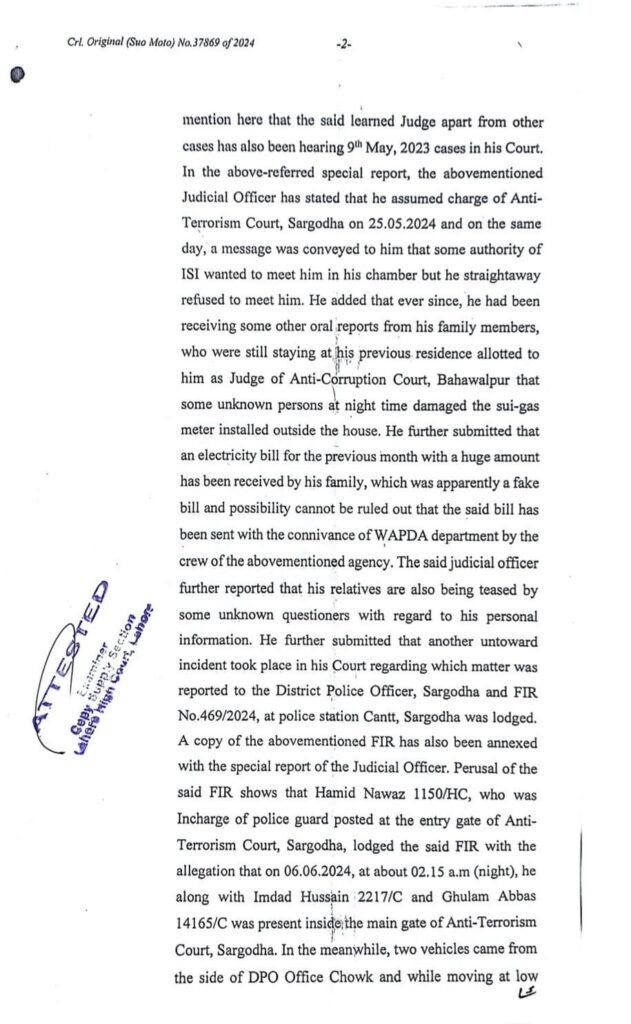
On June 20, 2024, the assistant of the Anti-Terrorism Judge Sargodha, Muneeb Ahmed, revealed dangerous developments in a special report submitted on June 13. The report highlighted an incident on June 11 at 11:15 p.m., where 6 to 7 plainclothes paid an unforeseen visit to his house and interrogated Ahmed about the decisions of ATC Judge Muhammad Abbas. Ahmed was coerced into writing on the back of four FIR copy forms that no judgment had been made by the ATC judge in the case and that there was no record or evidence on the case in the court. He expressed that this incident profoundly affected his family, particularly the children. The report emphasized the state’s duty to protect and respect the courts. A review of these special reports indicates serious intimidation, harassment, and obstruction of justice towards the courts and their staff.
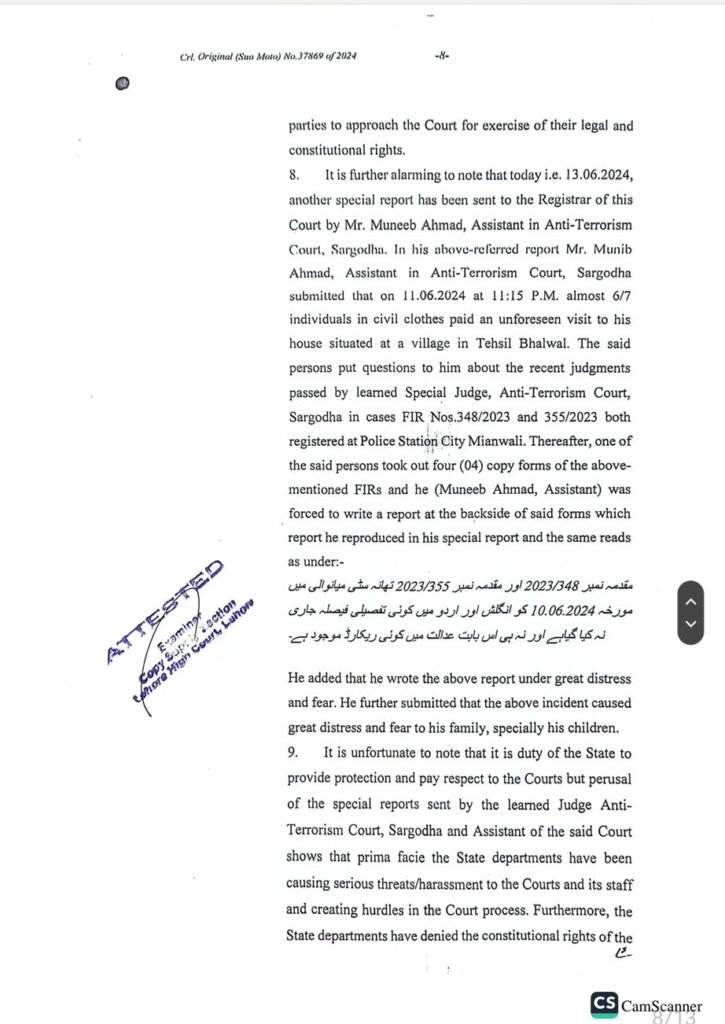
Rawalpindi Anti-Terrorism Court
In June 2024, Lahore High Court Chief Justice Malik Shehzad Ahmad Khan rejected the Punjab government’s request to transfer the May 9 cases from the Rawalpindi Anti-Terrorism Court to another court.
On June 20, 2024, the Court’s verdict revealed how the Rawalpindi Anti-Terrorism judge is facing difficulties in the trial: the lawyers of the accused are not allowed to enter. Their attendance is marked from the road, while the judge’s staff is being humiliated by agency men.
The judgement states, “the learned Judge […] pointed out different incidents to establish that in fact the Intelligence agencies and jail authorities have been trying to hamper the Court process in a Jail trial of 9 May, 2023 case. The accused arrested […] were not produced before him […] jail authorities on the asking of Intelligence Agencies made all sorts of effort to hamper the Court proceedings.”
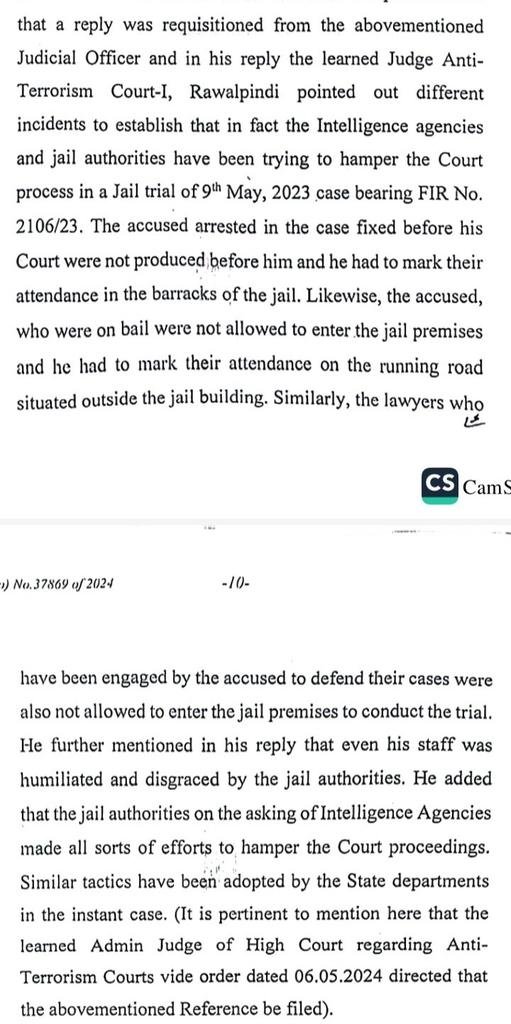
Judiciary under siege
The judges have finally given a long overdue pushback to the powerful military and have dared to speak against a shadowy influence that seeks to manipulate the scales of justice. In the same context, it is important to remember the military interference and involvement in politics, which have never let Pakistani politics and democracy mature.
The testimonies by Pakistani judges paint a grim picture of a judiciary under siege, where decisions are swayed not by the merits of law but by the machinations of unseen hands. This encroachment by the Pakistani military is not merely an insult to the judges who serve with integrity, but a direct attack on the principles of justice and fairness that are the bedrock of any democratic society.



